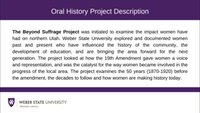| Title |
Buttschardt, Kym OH19_085 |
| Creator |
Weber State University, Stewart Library: Oral History Program. |
| Contributors |
Buttschardt, Kym, Interviewee; Storey, Sarah, Interviewer; Tooker, Sarah, Video Technician |
| Description |
The Beyond Suffrage Project was initiated to examine the impact women have had on northern Utah. Weber State University explored and documented women past and present who have influenced the history of the community, the development of education, and are bringing the area forward for the next generation. The project looked at how the 19th Amendment gave women a voice and representation, and was the catalyst for the way women became involved in the progress of the local area. The project examines the 50 years (1870-1920) before the amendment, the decades to follow and how women are making history today. |
| Abstract |
The following is an oral history interview with Kym Buttschardt, conducted on August 12, 2019, in the Stewart Library, at Weber State University, by Sarah Storey. In this interview, Kym discusses her life, her memories, and the impact of the 19th Amendment. Sarah Tooker, the video technician, is also present during this interview.; The following is a video clip of an oral history interview with Kym Buttschardt, conducted on August 12, 2019. In this video clip, Kym discusses the personal and work-life balance that many women strive for. |
| Image Captions |
Kym Buttschardt Circa 2019; Kym Buttschardt speaking about the work-life balance many women strive for. |
| Subject |
Voting--United States; Women--suffrage; Women--Rights of women |
| Keywords |
Weber State University; Universities and colleges; Business Owner--Female, Ogden--Historic 25th Street; Education; Entrepreneurship; Community Service/Volunteer Work; Mentor |
| Digital Publisher |
Stewart Library, Weber State University, Ogden, Utah, United States of America |
| Date |
2019 |
| Date Digital |
2019 |
| Temporal Coverage |
1967; 1968; 1969; 1970; 1971; 1972; 1973; 1974; 1975; 1976; 1977; 1978; 1979; 1980; 1981; 1982; 1983; 1984; 1985; 1986; 1987; 1988; 1989; 1990; 1991; 1992; 1993; 1994; 1995; 1996; 1997; 1998; 1999; 2000; 2001; 2002; 2003; 2004; 2005; 2006; 2007; 2008; 2009; 2010; 2011; 2012; 2013; 2014; 2015; 2016; 2017; 2018; 2019 |
| Medium |
oral histories (literary genre) |
| Spatial Coverage |
Salt Lake City, Salt Lake, Utah, United States, http://sws.geonames.org/5780993, 40.76078, -111.89105; Ogden, Weber County, Utah, United States, http://sws.geonames.org/11788968, 41.22809, -111.96766; District of Columbia, Washington, D.C., United States, http://sws.geonames.org/4138106, 38.91706, -77.00025 |
| Type |
Text; Image/StillImage; Image/MovingImage |
| Access Extent |
37 page PDF; Video clip is an mp4 file, 46.6 MB |
| Conversion Specifications |
Filmed using a Sony HDR-CX430V digital video camera. Sound was recorded with a Sony ECM-AW3(T) bluetooth microphone. Transcribed using Express Scribe Transcription Software Pro 6.10 Copyright NCH Software. |
| Language |
eng |
| Rights |
Materials may be used for non-profit and educational purposes, please credit University Archives; Weber State University; Music from Uppbeat (free for Creators!): https://uppbeat.io/t/yeti-music/gentle-breeze; License code: IWGKRYG7XHQOMZY0; Music from Uppbeat (free for Creators!): https://uppbeat.io/t/simon-folwar/hope; License code: KYI5VLB63GF1TXND |
| Source |
Buttschardt, Kym OH19_085 Weber State University Archives |
| Format |
application/pdf; video/mp4 |
| ARK |
ark:/87278/s6mw47qz |
| Setname |
wsu_bs_oh |
| ID |
105493 |
| Reference URL |
https://digital.weber.edu/ark:/87278/s6mw47qz |
| Title |
Buttschardt, Kym OH19_085 |
| Creator |
Weber State University, Stewart Library: Oral History Program. |
| Contributors |
Buttschardt, Kym, Interviewee; Storey, Sarah, Interviewer; Tooker, Sarah, Video Technician |
| Description |
The Beyond Suffrage Project was initiated to examine the impact women have had on northern Utah. Weber State University explored and documented women past and present who have influenced the history of the community, the development of education, and are bringing the area forward for the next generation. The project looked at how the 19th Amendment gave women a voice and representation, and was the catalyst for the way women became involved in the progress of the local area. The project examines the 50 years (1870-1920) before the amendment, the decades to follow and how women are making history today. |
| Abstract |
The following is an oral history interview with Kym Buttschardt, conducted on August 12, 2019, in the Stewart Library, at Weber State University, by Sarah Storey. In this interview, Kym discusses her life, her memories, and the impact of the 19th Amendment. Sarah Tooker, the video technician, is also present during this interview. |
| Image Captions |
Kym Buttschardt Circa 2019 |
| Subject |
Voting--United States; Women--suffrage; Women--Rights of women |
| Keywords |
Weber State University; Universities and colleges; Business Owner--Female, Ogden--Historic 25th Street; Education; Entrepreneurship; Community Service/Volunteer Work; Mentor |
| Digital Publisher |
Stewart Library, Weber State University, Ogden, Utah, United States of America |
| Date Digital |
2019 |
| Temporal Coverage |
1967; 1968; 1969; 1970; 1971; 1972; 1973; 1974; 1975; 1976; 1977; 1978; 1979; 1980; 1981; 1982; 1983; 1984; 1985; 1986; 1987; 1988; 1989; 1990; 1991; 1992; 1993; 1994; 1995; 1996; 1997; 1998; 1999; 2000; 2001; 2002; 2003; 2004; 2005; 2006; 2007; 2008; 2009; 2010; 2011; 2012; 2013; 2014; 2015; 2016; 2017; 2018; 2019 |
| Medium |
oral histories (literary genre) |
| Spatial Coverage |
Salt Lake City, Salt Lake, Utah, United States, http://sws.geonames.org/5780993, 40.76078, -111.89105; Ogden, Weber County, Utah, United States, http://sws.geonames.org/11788968, 41.22809, -111.96766; District of Columbia, Washington, D.C., United States, http://sws.geonames.org/4138106, 38.91706, -77.00025 |
| Type |
Text; Image/StillImage |
| Access Extent |
37 page PDF |
| Language |
eng |
| Rights |
Materials may be used for non-profit and educational purposes, please credit University Archives; Weber State University |
| Source |
Buttschardt, Kym OH19_085 Weber State University Archives |
| Format |
application/pdf |
| Setname |
wsu_bs_oh |
| ID |
105675 |
| Reference URL |
https://digital.weber.edu/ark:/87278/s6mw47qz/105675 |





